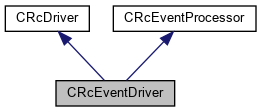|
Home2L - C/C++ API v1.4-2-g83f4c (2025-08-23)
Smart Tools for a Private Home
|
|
Home2L - C/C++ API v1.4-2-g83f4c (2025-08-23)
Smart Tools for a Private Home
|
Local driver using the event processor mechanism for the 'DriveValue()' functionality.
The class is useful for the Python API to allow writing simple applications (e.g. 'rules' scripts) without parallel threads and an event loop design.
Definition at line 2573 of file resources.H.
#include "resources.H"

Public Member Functions | |
| CRcEventDriver (const char *_lid, ERcState _successState=rcsBusy) | |
| Initialize the driver (does not register). | |
| virtual const char * | TypeId () |
| (optional) Hint for the main event loop: object type | |
| virtual const char * | InstId () |
| (optional) Hint for the main event loop: object instance | |
 Public Member Functions inherited from CRcDriver Public Member Functions inherited from CRcDriver | |
| void | Register () |
| Register and enable the driver. This must be done between the calls to RcInit() and RcStart(), i.e. the initialization phase. The class takes over the ownership of 'this', which must be a dynamically allocated object, which is deleted during RcDone(). | |
| void | Unregister () |
| Unregister the driver. This is only allowed in the elaboration phase or on shutdown. Calling this method will delete 'this' soon, so that no further accesses are allowed after this. | |
| CResource * | RegisterResource (const char *rcLid, const char *rcTypeDef, void *_data=NULL) |
| see also: CResource::Register() | |
 Public Member Functions inherited from CRcEventProcessor Public Member Functions inherited from CRcEventProcessor | |
| void | PutEvent (CRcEvent *ev) |
| Enqueue/process an event; caller remains owner of 'ev'. | |
| bool | PollEvent (CRcEvent *ev) |
| Check for an event (non-blocking) and return it at '*ev'. | |
| bool | WaitEvent (CRcEvent *ev, TTicks *maxTime=NULL) |
| Wait for an event and return it at '*ev'. | |
| void | Interrupt () |
| Request a running WaitEvent() to stop now. | |
| void | FlushEvents () |
| Remove all presently queued events; also waits until a concurrently running OnEvent() invocation returns. | |
| virtual bool | OnEvent (CRcEvent *ev) |
| Handle an event asynchronously (may have been called from any thread) | |
| void | SetInSelectSet (bool _inSelectSet) |
| Set whether or not the event processor is contained in the set of upcoming Select() operations. | |
Protected Member Functions | |
| virtual void | Stop () |
| The caller/owner must do this before 'RcDone()'. (The event processor may not work anymore by the time this method is called.) | |
| virtual void | DriveValue (CResource *rc, CRcValueState *vs) |
| Callback to drive a new value, will be called from CResource::DriveValue(). | |
 Protected Member Functions inherited from CRcDriver Protected Member Functions inherited from CRcDriver | |
| void | ClearResources () |
| Unregister all resources. | |
Additional Inherited Members | |
 Static Public Member Functions inherited from CRcDriver Static Public Member Functions inherited from CRcDriver | |
| static void | RegisterAndInit (const char *_lid, FRcDriverFunc *_func) |
| Create, register and initialize a function-based driver. | |
 Static Public Member Functions inherited from CRcEventProcessor Static Public Member Functions inherited from CRcEventProcessor | |
| static CRcEventProcessor * | Select (TTicks maxTime=-1) |
| Wait until any of the existing 'CRcEventProcessor' objects has an event available. | |
Initialize the driver (does not register).
| _lid | is the local ID. |
| _successState' | controls the value returned by 'DriveValue'. Note: These do a bit more than just setting the type of 'vs' in CRcDriver::DriveValue():
|
Definition at line 2575 of file resources.H.
|
protectedvirtual |
Callback to drive a new value, will be called from CResource::DriveValue().
When called, this method must propagate a new requested value to the device (e.g. to an actor). Afterwards, the new value and state pointed at by 'vs' will be reported automatically by the caller.
If there are no pending requests at all, this method is called with vs->State() == rcsUnknown. Most drivers will do nothing then (e.g. the "signal" driver does so) and keep the previous value active. Some drivers (e.g. brownies/shades) may switch off their actors now. For other drivers, please remember that unknown value/states may come in and must be ignored.
In all other cases, the state of '*vs' is preset with rcsValid.
IMPORTANT: It is not allowed to call any method of the 'rc' object (e.g. 'Report' methods) from here, since the resource may be locked.
It is legal to modify '*vs' to reflect a new state or even a value different from the driven one. The method shall change the value and eventually the state as adequate.
If the new value is not known yet, the state should be set to 'rcsBusy' by calling CRcValueState::SetToReportBusy() now on 'vs', and the new value should be reported later with a valid value and state of rcsValid by calling a 'CRcResource::Report...()' method.
To report a certain (e.g. the new) value with the rcsBusy state now, the state may be set to rcsBusy and the value be set as appropriate or left as it is, in which case the driven value is reported. Again, a valid value (state of rcsValid) should be reported later.
To report nothing at all this time, call CRcValueState::SetToReportNothing() on '*vs' or set the state to rcsUnknown.
In most cases, just writing to the device is sufficient.
Reimplemented from CRcDriver.